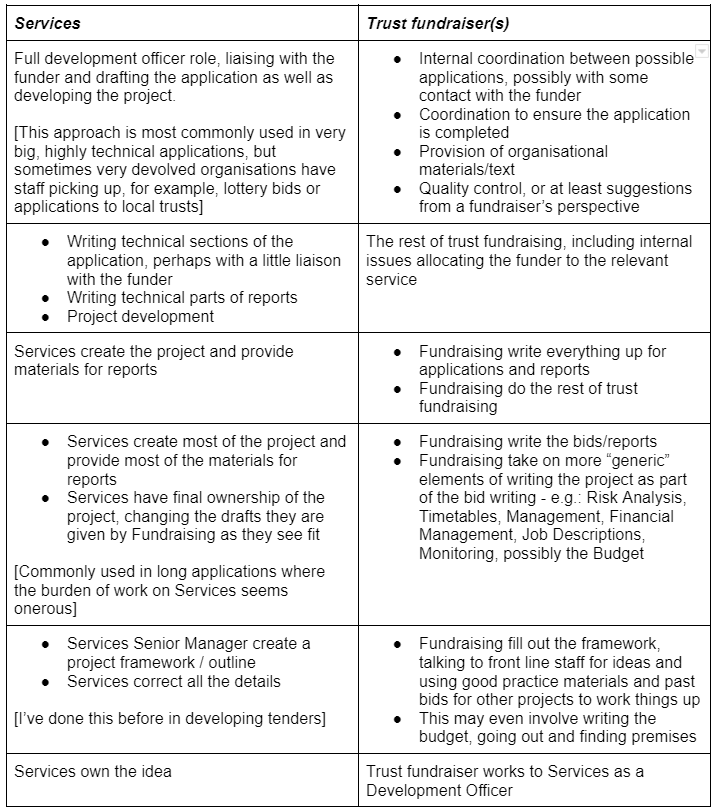Photos: Alex Green on Pexels and (insert) Sarah Pflug on Burst
This area of the site was written for very experienced trust fundraisers.
There’s a spectrum of possibilities
Some trust fundraisers will be surprised, when moving to a different charity, how differently the work can be split:
If you want to carefully appreciate what different option might look like, I’ve written a detailed page on this under the Project Development sub-menu, called “Styles of involvement in project development”. However, the Working with Services sub-menu is about splits of work and so I’ll take up the actual arguments around different splits here.
I attended a course by Trust fundraising guru Bill Bruty where he was deeply skeptical about many of the above splits. He used the analogy of chefs and waiters. In a restaurant, chefs have one set of skills and focuses. The waiters have another. If you mix them up, you risk problems.
Having worked to all the above approaches, I totally agree that there are plenty of issues. I just don’t agree with the conclusion. There are a lot of considerations:
- Necessity: If you won’t do some development work, sometimes huge, valuable applications simply won’t go out. Also, occasionally areas of development have proved too technical for Services to do them. An example of the latter situation: I’ve often had to lead on service user involvement for Lottery applications, because my colleagues in Services simply didn’t know how to do the work so as to cover all the different facets of service user involvement and/or they didn’t know how to set up service user involvement so that service users get the chance to create real change, rather than, for example, just rubber stamping staff ideas.
- Productivity: I worked in a couple of charities where Services were hugely involved and the trust fundraising team could get more done as a result. It’s hard to argue with this, especially when these approaches are baked into your targets! On the other hand, taking on service development can use a lot of your time – it’s probably the number one reason I’ve struggled to meet target.
- Knowledge and skills requirements: I’ve tried to teach some of the Services-type skills on this web site, because some trust fundraisers wouldn’t have the necessary abilities, otherwise. Where I’ve worked in a team developing services for bids, that were then delivered up by Services, the Services teams could be annoyed that bits of the service model weren’t properly thought through in some respects and they absolutely had to be involved to get things right. (On the flip side, I’m yet to meet anyone from Services who could do first rate research and engagement of a funder – whatever some of them might imagine!) You also have to be careful not to try and commit Services teams to do things that they lack the knowledge and skills to manage, too.
- Ownership: If you make something up for someone else, it’s definitely harder to get them to deliver it. You’ll end up having to stand over them a bit to ensure they deliver the good work – that the charity agreed it wanted and that was included because it enabled the grant to get made. The best answer is to get Services to rework things a bit, so they have some sense of ownership. However, it’s not easy at times.
- Blurring of the lines for the future. In bigger organisations, blurring of demarcation lines can create confusion for the future and/or lead people to say “That’s your responsibility” when, really, it isn’t, it just was for a one-off, exceptional situation.
- Senior management. It’s been very rare for senior management in Services to say “You can’t help my staff out with the development work,” but I’ve absolutely had senior Fundraising managers tell me that it’s not in my role.
- Massive, quick projects: In my experience, it’s normally a matter of dropping everything and filling in where there are gaps in the structure. As the bid writer/one of the bid writers, I’d be reluctant to start filling in where people aren’t keeping up, though, because the chances are that the bid writing and bid coordination workload will be hard enough to keep up without trying to stretch yourself further. At least in the last week.
I’ve seen lots of hugely successful, big projects enabled via non-conventional splits of work. However, it’s definitely a lot harder.


